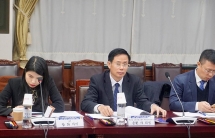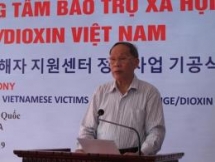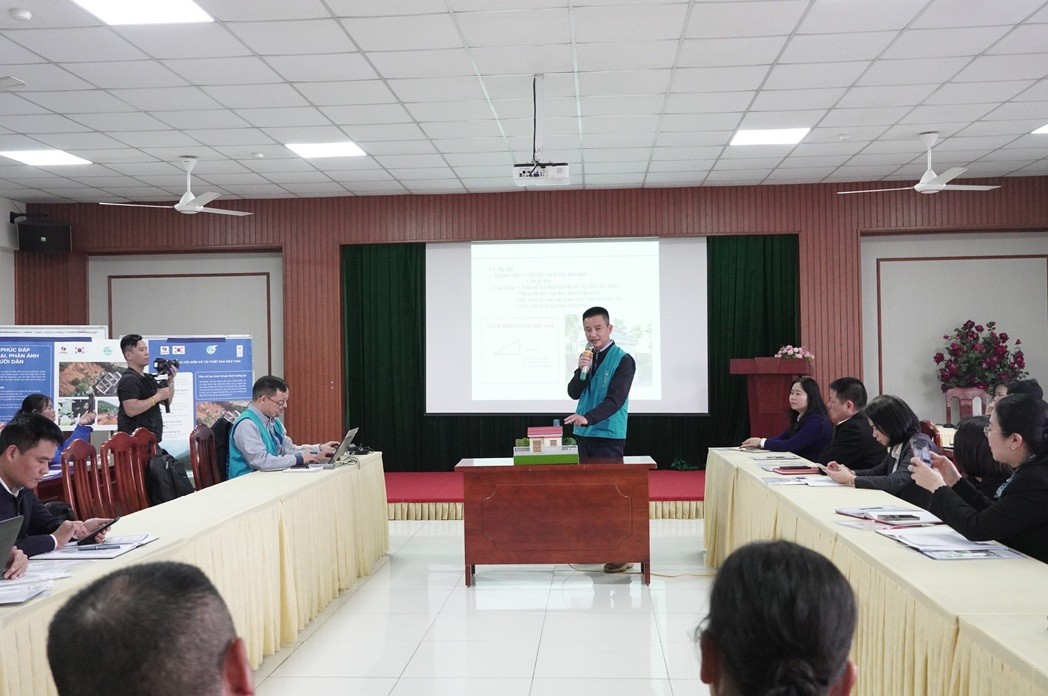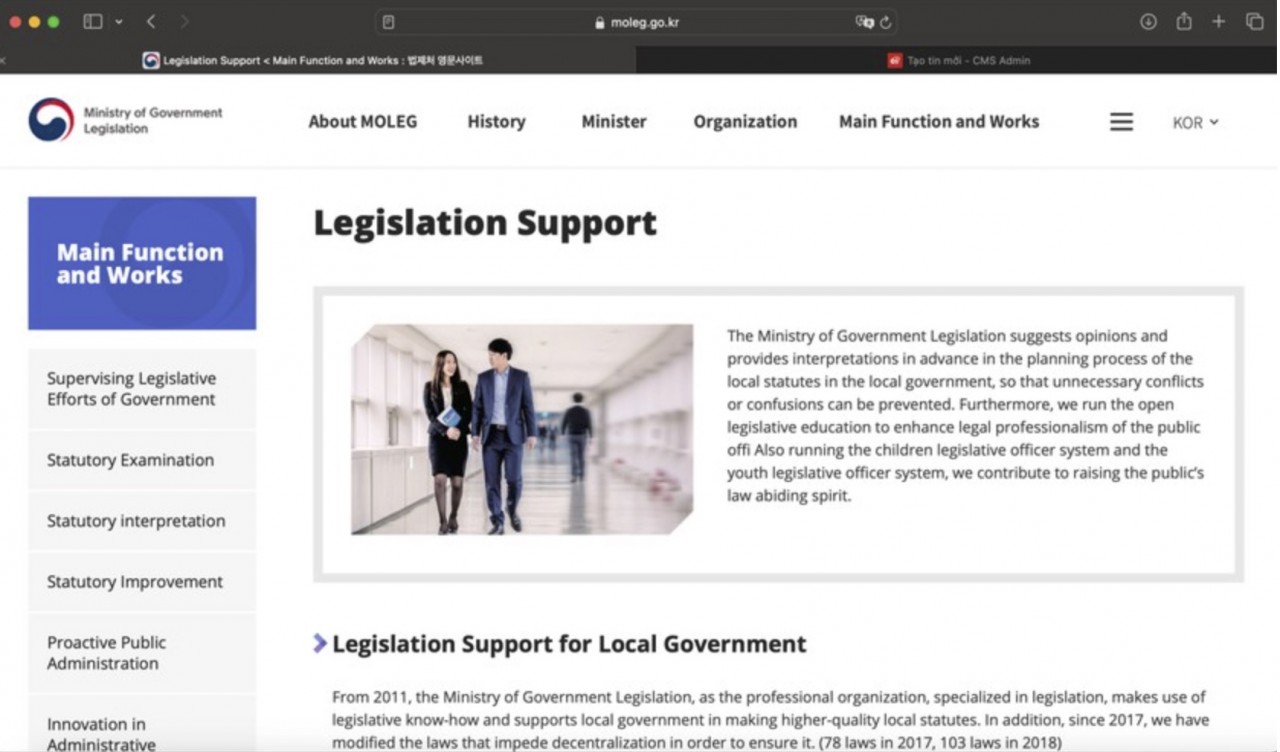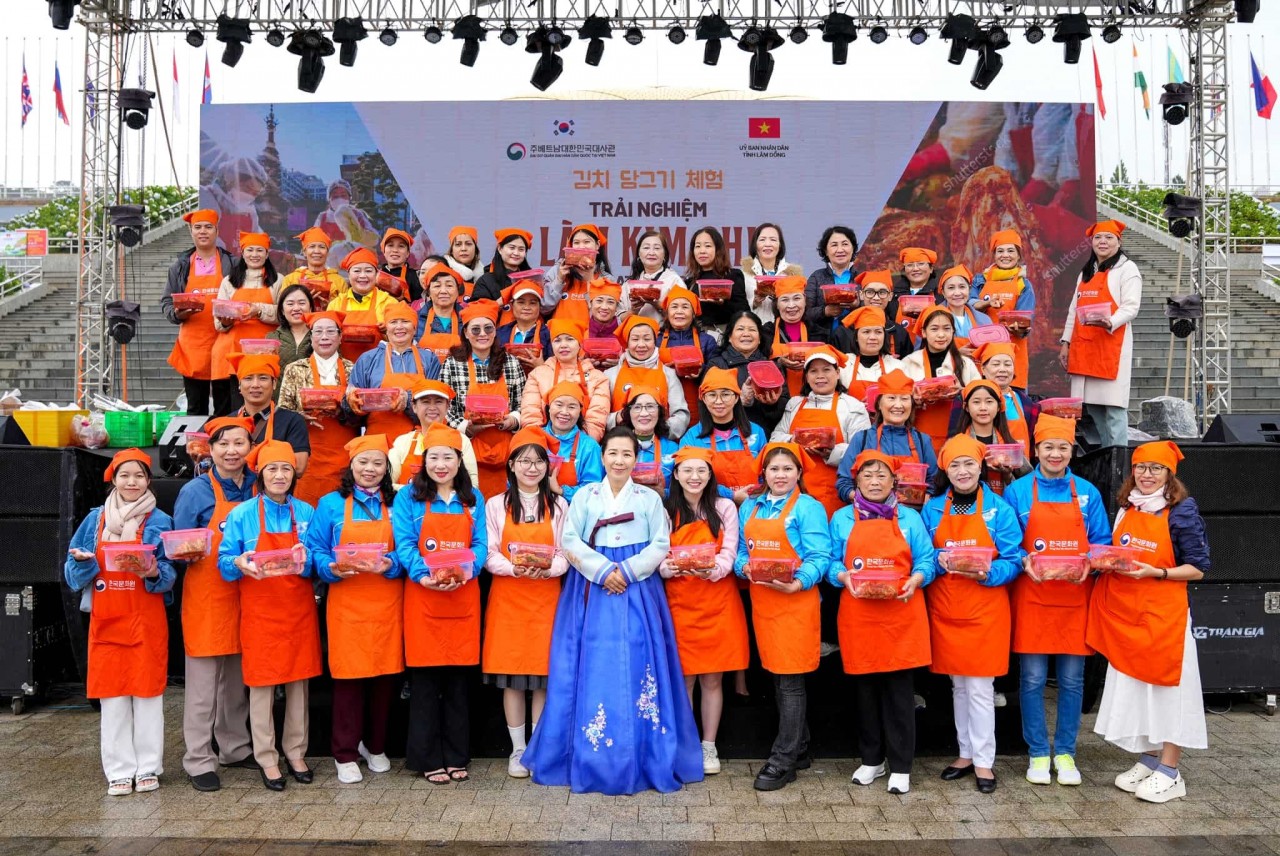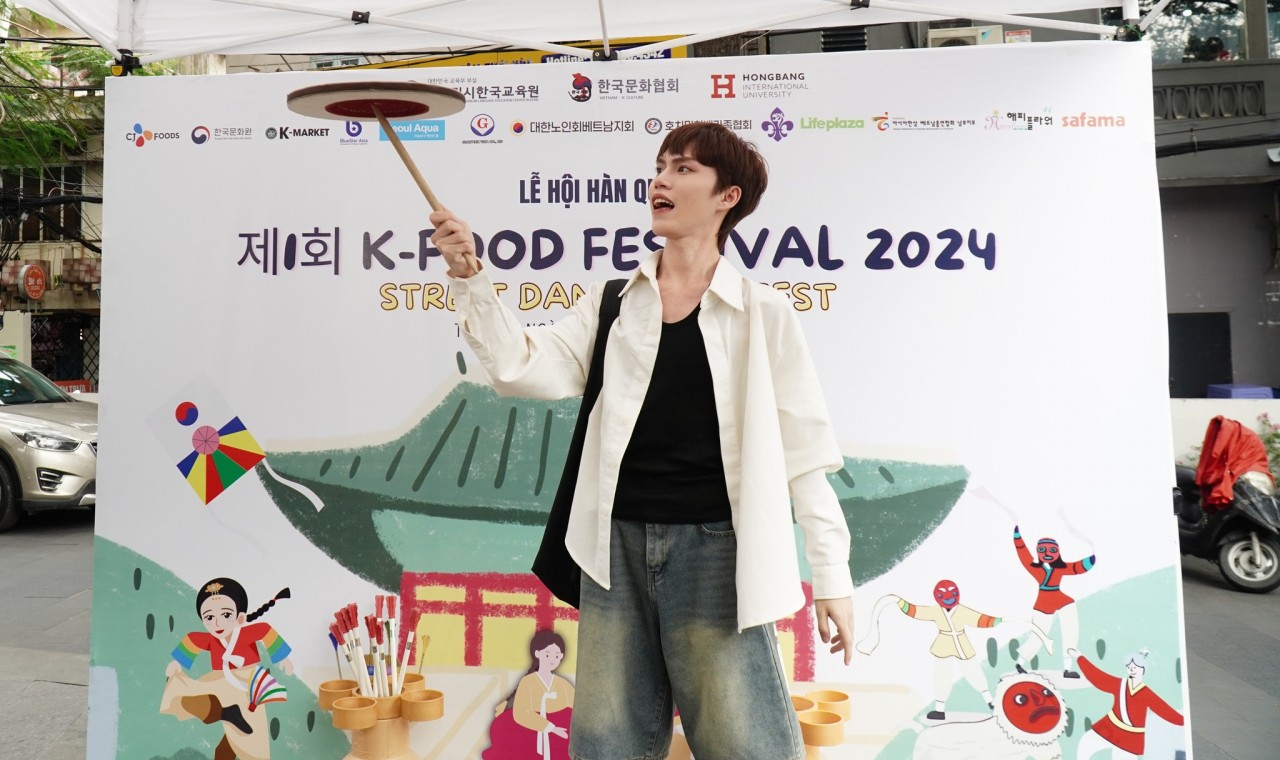PM’s RoK trip expected to further enhance bilateral relations
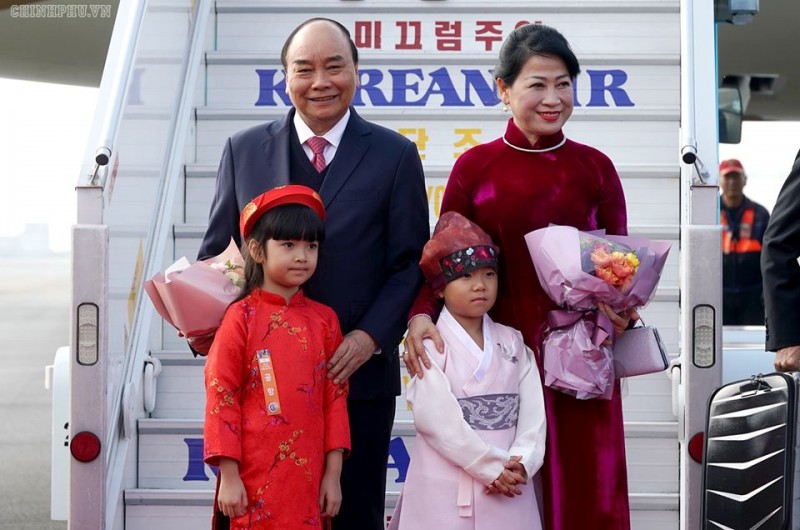 |
| Prime Minister Nguyen Xuan Phuc and his entourage arrive in Busan on November 24 afternoon. Photo: VGP |
Welcoming the Vietnamese delegation at the Gimhae military airport were the RoK Deputy Minister of Foreign Affairs, the Mayor of Busan city, the RoK Ambassador to Vietnam and the Vietnamese Ambassador to the RoK, among others.
During the November 24-28 trip made at the invitation of President Moon Jae-in, in Busan, the economic, cultural and educational centre of the southeastern region of the RoK, PM Phuc will attend the ASEAN-Republic of Korea (RoK) Commemorative Summit in celebration of the 30th anniversary of the two sides’ dialogue relations and the first Mekong-RoK Summit.
He will also take part in the ASEAN-RoK CEO Summit, the Innovation Showcase 2019, and the ASEAN-RoK Startup Expo, as well as hold meetings with Busan leaders.
After attending these events, PM Phuc will pay an official visit to the RoK. The visit is the first by a Vietnamese PM in seven years, and is of significance to strengthening cooperation between the two countries in the new context.
The ASEAN-RoK Commemorative Summit was proposed by the RoK at the 20th ASEAN-RoK Summit in November 2018 in Singapore, aiming to celebrate the 30th founding anniversary of bilateral relations (1989-2019). It will take place on November 25 and 26.
The summit offers an opportunity for leaders of ASEAN member countries and the RoK to review the 30-year collaboration and promote orientations for the ASEAN-RoK strategic partnership in the next three decades on the basis of the present fruitful and comprehensive ties.
The ten-member group and the RoK established ties in 1989 and advanced their relationship to the level of comprehensive cooperative partnership in 2004, which was elevated to a strategic partnership in 2010. Two years later, the RoK dispatched its ambassador and established a mission to the ASEAN.
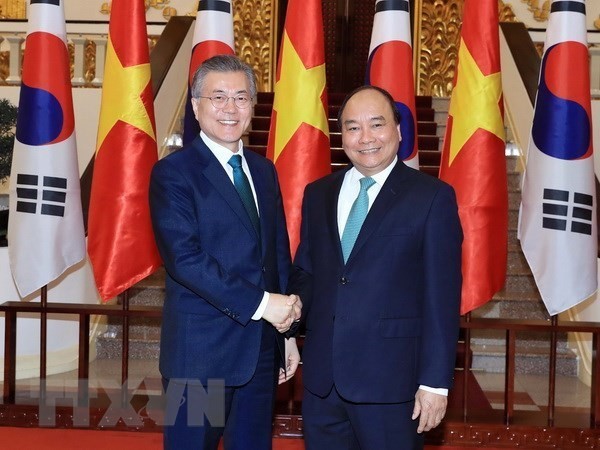 |
| PM Nguyen Xuan Phuc (right) and Korean President Moon Jae-in. Photo: VNA |
The RoK attaches importance to its relations with the ASEAN, supports the grouping to build the ASEAN Community and realise the 2025 Community Vision and enhance security cooperation to match the two remaining pillars, with priorities given to partnerships in non-traditional security cooperation such as the fight against cross-border crime, terrorism and drugs, as well as cyber security and maritime security.
The East Asian country has backed the ASEAN’s central role in the regional architecture and actively participated in many ASEAN-led regional forums.
In the sphere of economy, the RoK is the ASEAN’s fifth largest trading partner and investor, while the bloc is the RoK’s second largest trading partner. Last year, two-way trade hit 160.5 billion USD. The East Asian nation poured 6.6 billion USD in foreign direct investment (FDI) into the ASEAN.
The number of tourists from the ASEAN countries to the RoK exceeded 10 million in the year. The grouping has become the most popular destination for Koreans.
The Mekong-RoK cooperation was initiated at the 13th ASEAN-RoK Summit on October 29, 2010 when Korean President Lee Myung-bak proposed organising the Mekong-RoK Foreign Ministers’ Meeting in order to enhance political and economic ties between Mekong River Basin countries and the RoK, narrow development gaps and push ahead with the building of the ASEAN Community.
The first Mekong-RoK Summit will take place in Busan on November 27, under the co-chair of the Korean President and the Thai Prime Minister.
Vietnam and the RoK set up diplomatic ties on December 22, 1992. Over the past 27 years, the bilateral relationship has made comprehensive strides, and been maintained at different levels.
Vietnam opened its embassy in Seoul in March 1993. In November the same year, the RoK also opened its Consulate General in Ho Chi Minh City. In August 2011, the two sides issued a joint statement on the comprehensive partnership in the 21st century on the occasion of the visit to the RoK by the then President Tran Duc Luong. In October 2009, the two countries lifted their relationship to a strategic cooperative partnership during the visit to Vietnam by the then President Lee Myung-bak.
The two sides have maintained the deputy ministerial-level foreign affairs, defence and security strategic dialogue, the deputy ministerial-level security dialogue and the deputy ministerial-level defence dialogue.
The two countries also signed a memorandum of understanding (MoU) on information security and safety and another on military information security, along with the cooperation minutes on dealing with consequences of bombs and mines left over from the wars, and a joint vision statement on defence cooperation by 2030.
In the economic sector, the RoK is one of Vietnam’s leading important partners, ranking first in investment, second in official development assistance (ODA) provision after Japan, and third in trade after China and the European Union.
The two countries have maintained bilateral cooperation mechanisms like the Inter-Governmental Committee on Economic, Scientific and Technical Cooperation and the ministerial-level joint committee on cooperation in nuclear power, energy and industry.
Besides, the RoK is Vietnam’s second largest labour importer and Vietnam is the second largest labour exporter of the RoK. Currently, more than 48,000 Vietnamese guest workers are working in the RoK.
The two countries re-signed the MoU on dispatching and receiving Vietnamese workers under the Employment Permit System (EPS) during the State visit to Vietnam by President Moon Jae-in in March 2018.
Over the past years, the RoK has emerged as a major source of tourists to Vietnam. In the first nine months of 2019, the number of Korean visitors to the Southeast Asian nation was over 3.14 million, up 22.5 percent year-on-year. Currently, there are more than 1,000 direct flights between the two countries each month.
Statistics from the Korean side show that as of June 2019, there were more than 216,000 Vietnamese in the RoK. The number of Koreans in Vietnam was over 150,000, almost businesspeople.
Nearly 60 cities and provinces of the two countries have signed cooperation agreements./.
Recommended
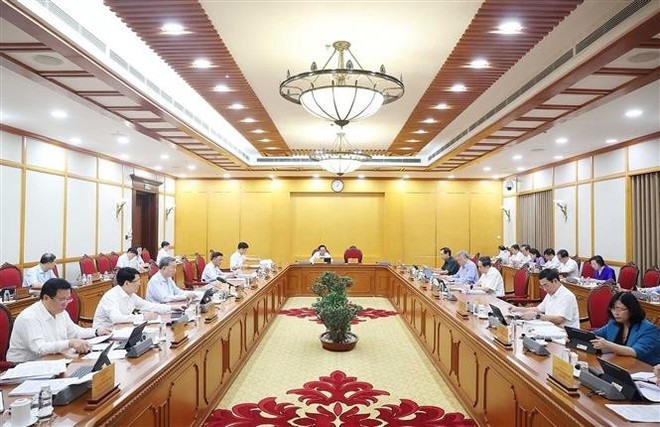 National
National
Vietnam News Today (Jun. 7): Prime Minister works with Estonian firms to accelerate projects in Vietnam
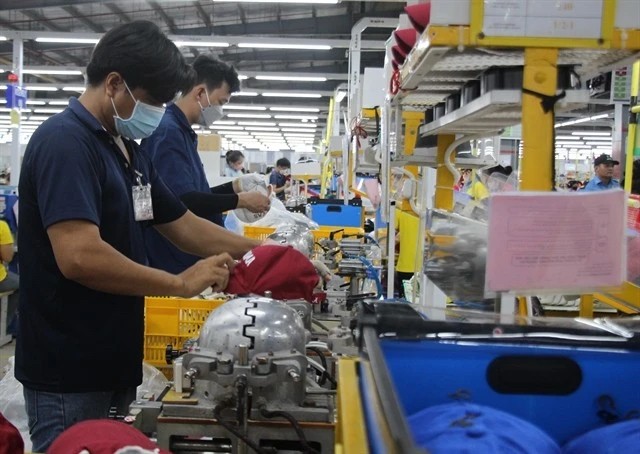 National
National
Vietnam News Today (Jun. 6): Foreign Investment in Vietnam Surges in Five Months
 National
National
Vietnam News Today (Jun. 5): PM sets off for attendance at UNOC 3 in France, official visits to Estonia, Sweden
 National
National
Vietnam News Today (Jun. 4): Vietnam - Promising Candidate for Southeast Asia’s Next Powerhouse
Popular article
 National
National
Shangri-La Dialogue 22: Vietnam Highlights Some Issues of Ensuring Stability in a Competitive World
 National
National
Vietnam News Today (Jun. 3): PM Pham Minh Chinh to Attend UN Ocean Conference, Visit Estonia, Sweden
 National
National
Vietnam News Today (Jun. 2): Vietnamese Trade Mission Sounds Out Business Opportunities in United States
 National
National

